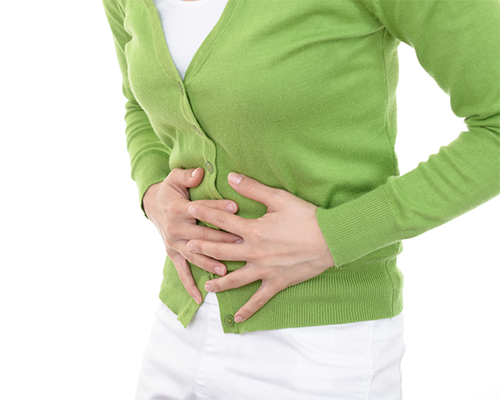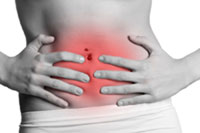
What is Crohn’s Disease?
Crohn’s disease is a chronic disorder of the gastrointestinal (GI) tract. It is one of the disorders in the group called Inflammatory bowel diseases (IBD). It causes inflammation of the tissue of the GI tract and can impact any area from the mouth to the anus. It is most commonly found in the last part of the small intestine, (known as the ileum) and in the beginning of the colon. The inflammation can extend through the entire wall of the GI tract. Crohn's Disease is not limited to the digestive tract. It can involve skin and create arthritic changes in joints as well.
Is Crohn's Disease the same as inflammatory bowel disease?
It is one disorder in the group called inflammatory bowel diseases (IBD). Crohn’s has its own unique set of symptoms and causes. Ulcerative Colitis is another common IBD condition.
Who gets it?
About 1.4 million Americans have either Crohn’s Disease or Ulcerative Colitis. Crohn’s Disease can occur at any age; though it is most commonly diagnosed between ages 15-30 but may also be found in the 50-80 age group. Males and females are equally affected.
Is it genetic?
No direct inheritable gene has been found, yet there appears to be a genetic connection because the disease often runs in families. The risk of developing the disease is between 5.2-22.5% if a first-degree relative (parent, sibling or child) has the disease.
Why does it happen?
The cause of Crohn’s Disease is unknown at this point. Researchers are working hard to determine a cause. We do know that nothing YOU did made you develop Crohn’s Disease. The disorder involves the body’s immune system acting inappropriately. Usually, the immune system works to protect the body from infection. An abnormal response may be related to the genes a person has, and/or something in the environment that causes the immune system to be activated when it does not need to be. Ultimately, the immune system is “turned on” and ready to fight. This can cause inflammation and damage to the lining of the GI tract, leading to symptoms. Most often Crohn’s disease affects the ileum (the lower part of the small intestine, but it can involve the entire length of the colon including the rectum and anus.

Symptoms of Crohn's Disease
- Persistent Diarrhea
- Abdominal pain
- Fever
- Rectal bleeding
- Loss of appetite
- Weight loss
- Fatigue
Severity of Symptoms
Symptoms can range from mild to severe. Again, Crohn’s Disease can affect any portion of the GI tract from mouth to anus. Symptoms depend on what portion of the GI tract is affected. If your stomach and small intestine is affected, your symptoms may be different from someone else who has the disease in their colon. Sometimes, it takes many years of symptoms before the disease is diagnosed. People can go through periods of “flares” when symptoms get worse due to active disease and inflammation; and “remission” when symptoms improve.
Additional Issues Associated with Crohn's Disease
In addition to affecting the GI tract, Crohn’s Disease can cause problems outside the GI tract such as:
- Arthritis, usually in large joints.
- Eye problems including uveitis, iritis and episcleritis (redness, pain, itchiness).
- Skin disorders, such as; erythema nodosum (a red nodular rash on the shins) and pyoderma gangrenosum (large painful sores form, mainly on the legs).
- Primary sclerosing cholangitis (inflammation and scarring of the bile ducts in the liver).
- Secondary amyloidosis (condition with proteins building up in the tissues and organs) leading to kidney problems
- Blood clots in arteries or veins as a result of hypercoagulability
- Kidney stones
- Bone loss from decreased absorption of vitamin D and calcium. The risk is also increased if steroids have been used
- Vitamin B12 deficiency
How is it diagnosed?
There is not one test or exam finding to diagnose Crohn’s Disease. It is determined based on a combination of findings. Typically, some, or all of the below will be used:
- History of symptoms concerning for Crohn’s Disease with physical examination
- Laboratory studies may be obtained to look at blood counts, electrolytes, markers of inflammation, liver function, kidney function and stool studies. A blood test may be ordered that measures antibody levels that help determine the difference between Ulcerative Colitis and Crohn’s Disease.
- Colonoscopy to look at the tissue of the colon and last part of the small intestine, the terminal ileum. Sample of the tissue (biopsies) can be taken to be examined with a microscope.
- Upper endoscopy to look at the esophagus (the tube that connects the mouth to the stomach), stomach and first part of the small intestine, the duodenum.
- Imaging studies may be obtained including barium studies with an enema, a small bowel follow through, or a computed tomography (CT) or magnetic resonance imaging (MRI)
How is it treated?
There is no cure at this point for Crohn’s Disease. Medicines are used to treat symptoms and to decrease inflammation so the tissue of the GI tract can heal. The goal of treatment is to “induce remission,” meaning getting symptoms and inflammation under control. After remission is achieved, the goal is to “maintain remission”.
What can I do about my Crohn's Disease?
Good nutrition is key as nutritional deficiencies are possible because of poor absorption, chronic diarrhea, decreased appetite and increased energy needs of the body because of the chronic disease.
- Take your medications. Finding the regimen that works for you can be a trial and error process. Once you find the best way to manage your Crohn’s stick with it to avoid flares.
- Keep a food diary to develop an awareness of what foods are best for you. Then manage your diet accordingly.
- Regular exercise is important contributing to better sleep and reducing stress.
- Stop smoking.
- Avoid nonsteroidal anti-inflammatory drugs, (ex. Ibuprofen or naproxen) because these can worsen the condition.
- Crohn’s Disease can affect absorption of key nutrients. It is very important to work closely with your provider before starting any supplements
Crohn’s is a lifelong condition. Working together with your provider can help to achieve optimum long-term health.
Are you suffering from Crohn's Disease?
GI Associates offer a variety of treatments for Crohn's Disease in Wausau, WI Call one of our offices at (877) 442-7762 for more information today!
Inflammatory Bowel Disease (IBD)
We provide comprehensive evaluation and management for our Crohn's & Colitis patients
Crohn's disease is a chronic inflammatory disease of the gastrointestinal tract. The most common areas it affects are the ileum, the lower portion of the small intestine, and the colon. Granulomatous ileitis and regional ileitis are other names for this disease. It is one of two disorders grouped in the condition called inflammatory bowel disease. The other disorder is Ulcerative Colitis. Crohn's disease causes inflammation of the entire thickness of the bowel wall. The cause of Crohn's is not known, but it is aggravated by bacterial infections and inflammation. Crohn's affects women slightly more often than men and appears to run in some families. About 1 to 5 per 10,000 individuals have Crohn's disease. The most commonly affected individuals are between the ages of 15 and 25 years.
Detection of Crohn's is by a flexible sigmoidoscopy, a procedure where a lighted flexible instrument is inserted into the rectum to view the lower portion of colon and rectum. Tissue samples are taken from the colon and sent for microscopic examination. Alternative detection methods are colonoscopy, a procedure similar to a flexible sigmoidoscopy but with a longer instrument, or barium enema x-ray. This is a lifelong condition in most individuals, but the disease course varies. Many individuals will not have symptoms after the first couple of attacks. Others will have recurrent symptoms. The majority of individuals with Crohn's can carry on a normal life but can expect a shorter total life expectancy. Medications can control the symptoms. This condition often requires surgery.
Living With Your Diagnosis
Abdominal pain and chronic diarrhea are the most common symptoms of Crohn's disease. The abdominal pain is usually right sided or around the navel. Eating may make the pain worse. The diarrhea can sometimes be bloody. It also can be severe enough to cause malnutrition. Other symptoms include fatigue, weight loss, loss of appetite, and fever. Symptoms are not limited to the gastrointestinal tract. About 20% of individuals will have joint pains. Others will have skin lesions.
Complications of Crohn's are many and varied. Bowel obstructions (blockages) are common. Fistulas and fissures in and around the anus and rectum can form. A fistula is an abnormal passage between two parts of the intestine or the intestine and the skin, bladder, or vagina. A fistula between two portions of bowel allows food to bypass certain areas of the bowel and causes malabsorption. A fistula between the intestine and the skin, bladder, or vagina causes continuous drainage of bowel contents onto the skin or into the bladder or vagina. This can cause infections. Fissures are cracks in the skin. Infections can be a complication of both of these conditions.
Crohn's & Colitis Foundation of America
The Crohn's and Colitis Foundation of America is a non-profit, volunteer-driven organization dedicated to finding the cure for Crohn's disease and Ulcerative Colitis.
- Reference for Kid's and Teens with IBD
- Reference for Adults with IBD
- How is IBD diagnosed?
- What medications are available?
Treatment
The goal of treatment is to relieve symptoms, control the inflammation, and prevent complications. No treatment is necessary if there are no symptoms present. Mild symptoms of diarrhea are controlled with antidiarrheal agents and dietary fiber. If symptoms are more severe, antiinflammatory drugs such as sulfasalazine and corticosteroids are given. If infections are present from fistulas and fissures, antibiotics such as metronidazole may be effective. Pain relievers and a hot water bottle can provide relief from the abdominal pain and cramping. If malnutrition is present, vitamin and mineral supplements are needed.
About 70% of individuals with Crohn's disease will require surgery for the disease at some point in their life. During surgery, a portion of the bowel is removed. An ileostomy, with a plastic pouch to collect stool, is generally done. The surgery is often done to control the complications.
The DOs
- Maintain normal physical activity except when symptoms require bed rest.
- Take medications as prescribed.
- A heating pad or hot water bottle placed on the abdomen may help with the pain and cramping.
- To relieve the pain of a rectal fissure, sit in a warm tub of water.
-
See your physician regularly.
The DON'Ts
- Avoid fat in the diet.
- Avoid spicy foods, coffee, and alcohol. They can cause the diarrhea symptoms to worsen.
When to Call Your Doctor
- If you have symptoms of Crohn's disease.
- If you begin leaking stool through the skin or vagina.
- If fever or chills develop.
- If the number of bowel movements increase or if bleeding starts.
- If your bowel movement has a tarry appearance.
- If the abdomen becomes distended.
For More Information
National Foundation for Ileitis and Colitis
444 Park Avenue S, 11th Floor
New York, NY 10016-7374
800-343-3637
National Digestive Diseases Information Clearinghouse
2 Information Way
Bethesda, MD 20892-3570
http://www.niddk.nih.gov
Derived from Patient Teaching Guide, © Mosby, Inc. All Rights Reserved.
The contents of wired.MD are for informational purposes only. Nothing contained in wired.MD is intended to substitute for medical advice, diagnosis or treatment. If you have any health care related concerns or questions, please seek the advice of your physician or other qualified health care provider. You should never disregard professional medical advice or delay in seeking it because of something you have read or seen on wired.MD.
© copyright 2000-2012. All rights reserved.
